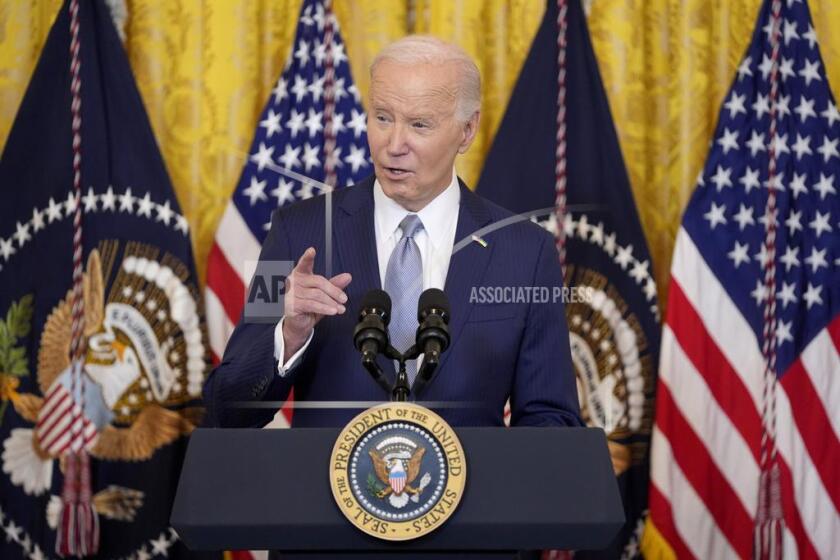Immigrants Protest English Class Cuts
For Ofelia Sanchez, a 23-year-old amnesty applicant from Mexico, learning English was like being born again.
She came to the United States in 1985 not speaking a word of English, a shortcoming that made everything around her seem frightening and left knots in her stomach as she tried to communicate with those around her.
But with her first lesson in English, she said, she felt a wave of relief, as if the world was opening to her again. She remembers with pride the first sentence she learned: “I am from Mexico. My name is Ofelia Sanchez.”
Sanchez, who works as a secretary while continuing to take English classes, is one of millions of amnesty applicants who began learning English in free, federally funded classes designed to help them enter the mainstream.
But because of a shortage of federal funds, the language programs face severe cutbacks. The state, which administers the federal funds, has proposed cutting the amnesty education budget by nearly 60% to continue providing funds for health and welfare programs that the state believes are more important.
At a press conference Tuesday, Sanchez and a group of community college educators appeared at Los Angeles City College to decry the cutbacks, which they say will gut a program that has been the main gateway into American society for millions of amnesty applicants.
“I want to learn English,” Sanchez said haltingly. “But maybe, I will have to find another way.”
Raul Puente, another amnesty applicant who has been attending English-as-a-second-language classes, said that although he is committed to continuing his education, the cutbacks in language classes would be a devastating blow.
“Everyone speaks English here, whatever you want to do, you must speak English first,” he said. “The best jobs, the best everything is in English.”
The money that pays for the language classes comes from a pool of federal funds known as State Legalization Impact-Assistance Grants.
The money was intended to reimburse state and local governments for medical, welfare and educational costs for immigrants legalized under the 1986 amnesty law.
In the early years of amnesty, close to 40% of the funds went to pay for free English and civics classes that most amnesty applicants were required to take.
But as more and more amnesty applicants have completed the language requirements, the funding has steadily dropped, from a high of $133 million in 1988 to a proposed level of just $40 million for next year.
Rose Campos Dosta, executive director of Community College Educators of New Californians, an association of English-as-a-second-language teachers, said California’s share of the federal funds, which are distributed by the state Health and Welfare Agency, has increasingly gone to health and welfare programs.
Dosta said the shifting of funds away from educational programs is shortsighted. “Are we going to mainstream people through public assistance?” Dosta asked. “I don’t think so. But we will through education.”
Dosta and other educators claim the money is being used to bolster health programs that--under the amnesty law--most amnesty applicants cannot apply for, such as food stamps.
But Jim Miller, a state Department of Finance official responsible for overseeing the budget for the Health and Welfare Agency, said all the federal money proposed for health and welfare programs would be used only to assist amnesty applicants.
“All of the funds are for programs that are for newly legalized persons,” Miller said. “We’re not taking the money and backfilling other programs.”
Miller said the problem for the state is that there is simply less of the federal money available.
Miller said the United States is expected to provide about $500 million next year in State Legalization Impact-Assistance Grants, about $27 million less than last year.
Miller added that because of the shortfall, the state has given top priority to health and welfare programs.
“We have to look at the most immediate needs,” he said. “All these programs provide some services to the population, but we have to establish some priorities.”
While educators concede that the health programs are important, they say English language programs deserve a fair share of the pie--and not the 8% they would get under the current state budget proposal.
“That’s just a tremendous imbalance,” said Joseph Flores of Los Angeles City College. “There is more than enough for next year to meet the health needs and the educational needs of the population.”
More to Read
Sign up for Essential California
The most important California stories and recommendations in your inbox every morning.
You may occasionally receive promotional content from the Los Angeles Times.







